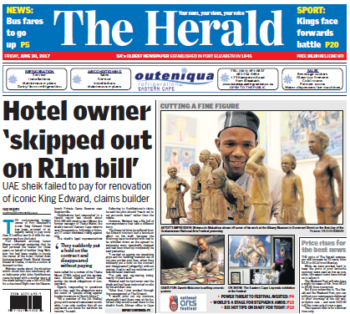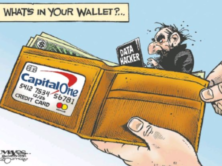
A recent Herald front page (Credit: Herald/Facebook)
The Herald newspaper in South Africa didn’t break an off-the-record agreement, the South African Press Ombudsman ruled.
The chief of staff for a South African municipality, Nelson Mandela Bay Municipality, accused the Herald‘s Johnnie Isaac of quoting from his off-the-record phone call in the May 9 story, “ME gets legal advice on Mettler appointment.” The story reported claims about an investigation into the appointment of Nelson Mandela Bay city manager. The chief of staff, Kristoff Adelbert, responded to the Herald‘s media inquiry for the story.
Adelbert complained to the press ombudsman that his phone call was off-the-record and that his on-the-record comment was sent in writing after the phone call. After the reporter, Isaacs, told Adelbert before publication that he was using quotes from the phone call, which he had recorded, Adelbert complained to the Herald’s politics editor, deputy editor and editor. “Your decision to include quotes from an informal conversation I had with Johnnie Isaacs, that was recorded without my knowledge and permission, is unacceptable and unprofessional,” he complained according to the ombudsman.
In an e-mail to iMediaEthics, Adelbert claimed the Herald only recorded two-thirds of the conversation and questioned how the ruling was made with “incomplete evidence.” The Herald‘s written submission says the recording was stopped “seconds before the call ended.”
Adelbert added, “I won’t be appealing as I can’t be distracted from the important work being done to turn this Municipality around, but going forward I will certainly be circumspect in all my dealings with the publication in question.” He also flagged the Herald deputy editor Nwabisa Makunga’s tweet referring to complaints as “little time wasters,” calling it unprofessional.
The Herald‘s reporter explained to the ombudsman he recorded the call because he didn’t have his notebook and wanted to ensure accuracy. Because he recorded the call, the reporter (Isaacs) was able to produce the recording that showed Adelbert never asked to be off the record. Further, the Herald noted that since Adelbert was responding to a media inquiry on behalf of the municipality, he should have known he was on the record.
“I have listened to the recording, and I have no evidence that Adelbert had at any time requested the telephone interview to be off the record,” the ombudsman Retief ruled. “On the contrary, he asked Isaac whether he wanted ‘all of that in writing’ – suggesting that he merely wanted to be sure that the reporter quoted him correctly.” Retief also praised the Herald for refusing to take the comments off the record after the fact.
“An interviewee only has legs to stand on if he or she asks a reporter to speak off the record at the beginning of a conversation, and the journalist agrees to it – it would put newspapers in an impossible position if subjects insist on chopping and changing comments for which they should take responsibility,” Retief explained. “I have no evidence to this effect in Adelbert’s case.”
In addition, Retief argued interviewees “should be grateful” for recorded interviews because they provide accuracy. While in some U.S. states, recording someone without their knowledge is against the law, Retief ruled that “there is no problem whatsoever if a journalist records a conversation which is on the record (as I take this one to be), even if the interviewee does not know about it.”
The Herald‘s editor, Brett Horner, told iMediaEthics that the newspaper uses “both notepads and recording devices (recorders, cell phones, cameras etc) as part of our documented reporting.”
“This safeguards both us and the public with whom we interact,” Horner explained. “The purpose is to achieve accuracy, and we believe it’s a responsible action on our part. This is the first time in my career I have seen a challenge based on the use of a recording device. The ombudsman’s comments suffice to show that there is nothing irregular with this practice, and is, in fact, desirable for the purposes of responsible reporting.”
The South African Press Council and Ombudsman comprise a “voluntary independent co-regulatory system” for the country’s print and online media, according to the council’s constitution. Media outlets voluntarily subscribe to regulation and are held to the council and ombudsman’s rulings.






